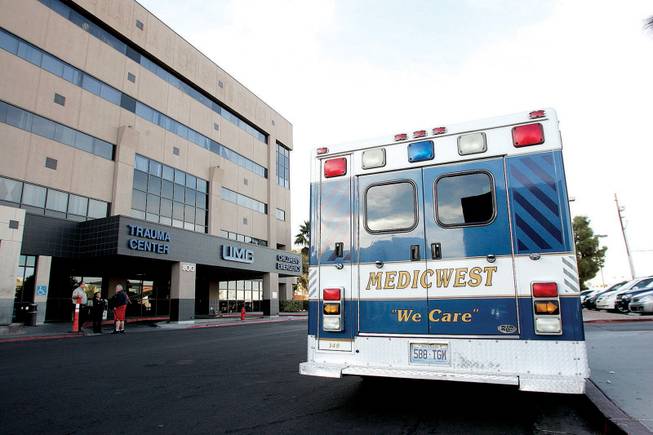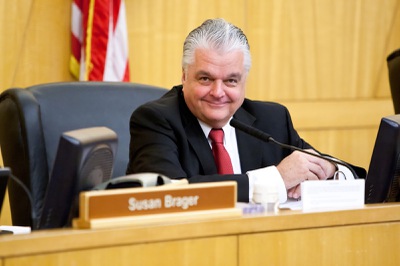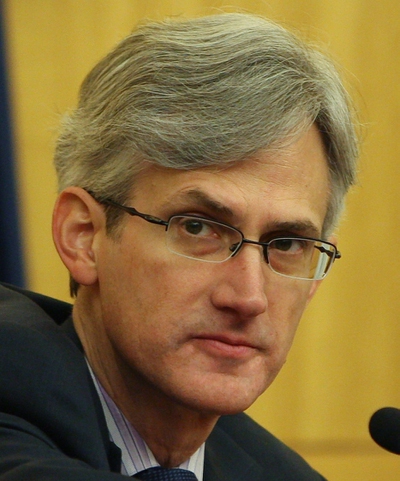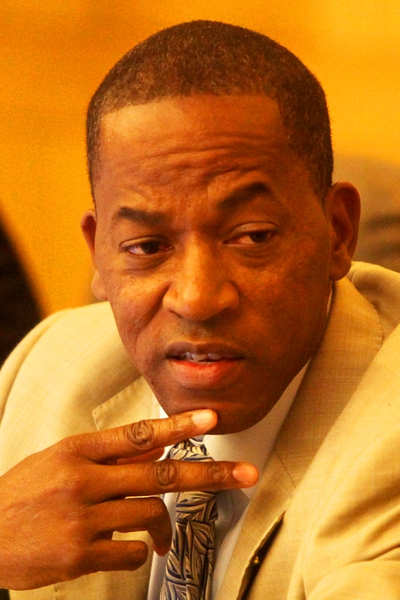Sunday, Aug. 18, 2013 | 2 a.m.
In July 2003, health care expert Larry Gage stood before the Clark County Commission to present a report about the challenges University Medical Center faced as a public safety-net hospital and how a change in governance could help the ailing operation find firmer financial footing.
Nearly 10 years to the day later, Gage returned to a different group of county commissioners. This time, Gage — who founded and for 30 years led the National Association of Public Hospitals and Health Systems — gave the report seated. But his message was essentially unchanged from 2003 — commissioners need to turn control of UMC over to an independent board of experts.
“This isn’t any different than what he recommended 10 years ago. He just had to dust off the report and update the figures,” Commission Chairman Steve Sisolak said. “We should have done this a long time ago.”
In the intervening decade between Gage’s appearances, the county has commissioned at least two more comprehensive reports on the hospital, formed several committees and studied the issue ad nauseam.
Although UMC faced myriad problems, a recurring theme throughout the reports was that the hospital could benefit from a change in governance.
But while municipal governments in cities like Minneapolis, Atlanta and Denver all made the switch to independently run nonprofit hospital systems, Clark County officials made little progress and UMC continued to struggle.
Gage’s most recent appearance in July helped galvanize the current group of commissioners, who had been acrimoniously divided on the issue for months. The board agreed to begin the process to establish an independent board with the hopes of turning over long-term strategy and policy development, among many other responsibilities, to an independent group beginning next year.
Commissioners hope the change will help the hospital cut costs, increase its revenues and position itself for a future where it won’t rely on an annual subsidy from the county, which this year totaled $30 million but has reached as high as $71 million in recent years.
“We’re not trying to say UMC should be profitable, that’s beyond anybody’s wildest dream,” Sisolak said. “But we have to do what we can to limit the losses; it can’t be a blank check at the end of every year.”
When those new board members take over in January, it will come at a critical point in the hospital’s history.
In addition to the steep challenge of turning around a hospital that has lost tens of millions of dollars year after year, the new board’s learning curve will be complicated by the federal Affordable Care Act, including an individual insurance mandate and Medicaid expansion, that will begin taking effect at the same time.
While leaders at other public hospitals have had years to prepare for the coming changes, UMC’s board members will have to learn as they go while they try to steer the hospital into an uncertain future.
“If this doesn’t work, I don’t know what we do,” Sisolak said.
The seeming inability of local elected officials to make fundamental changes to a hospital increasingly in need of an overhaul can be attributed to a number of factors.
Rory Reid, a former county commissioner, said after Gage’s 2003 report, a number of smaller changes were made and the economy began to improve after the early-decade recession, lessening the need for immediate action.
“UMC seems to have these pleasant interludes where nobody’s paying attention, interspersed with moments of crisis,” Reid said. “Historically, people have talked about substantial changes at UMC when there’s a crisis, and otherwise they accept the status quo.”
The booming growth of the mid-decade left the county flush with surplus funds it didn’t mind using as a subsidy for UMC, papering over broader problems brought on by the changing health care landscape.
A stretch of tumultuous leadership — one UMC chief executive was prosecuted for allegedly handing out millions in no-bid, no-work contracts to friends while another was pushed out after a string of controversies — drew commissioners’ attention away from long-term planning and into short-term crisis management.
Perhaps the biggest impediment to fundamental changes at the hospital is a culprit that has blocked progress on education and other major issues in the state — politics.
“It’s a political hot potato,” Sisolak said. “Elected officials don’t want to make hard decisions if we can kick the can down the road, and that’s what’s happened. Everybody keeps kicking that can instead of addressing it.”
The benefits of having an independent board can be hard to discern at first glance, but officials say the most important difference is time.
County commissioners serve on six to seven boards each, overseeing everything from flood-control channels to the region’s transit system. Those assignments leave limited time for them to deal with UMC, an operation that has only grown more complex through the decades.
Members of the new board — people with expertise in areas such as health care, finance or law, who will be recruited from the community — will have UMC as their primary focus and will meet in smaller subcommittees to dive into specific issues like contracts, labor issues, capital projects or quality of care.
Independent boards can also help boost philanthropic gifts to the institution — Atlanta’s Grady Health Systems has raised $325 million in recent years after a reorganization and concerted fundraising push — because unlike politicians, they can solicit donations without the same appearance of impropriety.
“You have a board of folks that aren’t constrained the way elected officials are about going out and having conversations with people in the community who can make those types of donations,” UMC CEO Brian Brannman said. ”If you’ve got some folks who are serving on your board and they’re moving in the circles where people make those kinds of donations, it makes it a lot easier for the foundation to put things together.”
Reorganizing governance is also much less costly, both in dollars and in political capital, than raising taxes to create a dedicated funding mechanism for UMC, another proposal that has been bandied about for years with no action.
The commission attempted once previously in 2010 to establish an independent advisory board for the hospital after yet another study recommended the action. But after a protracted search seated 11 members, little else was accomplished and the failed effort was abandoned late last year.
The board failed in part because not enough authority was delegated and most decisions still had to be approved by the county commission, Sisolak said.
“We said, ‘Here’s UMC. We’ve got all these problems; fix it. But we’re not let you going to do this, this or this,’” he said. “We put them in a position to make a decision and then said, 'Your decision doesn’t count, we can overrule you.' Nothing got done as a result.”
Commissioner Lawrence Weekly, who chairs the current UMC board, said the process was rushed and new board members weren’t given the tools to be successful.
Learning from the mistakes of the previous advisory board, Weekly said this time around commissioners have spent much more time figuring out specific responsibilities for the board.
Although commissioners will retain final authority over the hospital’s budget, almost every other significant governing and policymaking responsibility, including staffing, training and developing the hospital system, will be turned over to the new board, which will be smaller than the previous iteration, with likely seven to nine members.
Many issues are still to be determined, chief among them the transparency of the new board, and they will be discussed again at a September meeting.
Once the board takes over next year, it must begin sorting through a thicket of issues — including funding and gift-giving, UMC’s relationship to the University of Nevada School of Medicine and whether UMC will continue to function as a safety-net for the uninsured — that will all play into the hospital’s future.
Weekly said the hospital can’t continue being “all things to all people” and needs to focus on what it does best. The new board will determine part of that, but he said he hoped the entire community would be engaged in the discussion.
“Whatever it’s going to be, let’s talk about it. Let’s not do it behind closed doors with select people,” he said. “We’ve got to include taxpayers who’ve paid taxes (to the hospital) for a long time, people who have invested a lot because they’ve worked there. Let’s make sure all parties are involved. “We get there by communicating, by being really and truly transparent.”





Join the Discussion:
Check this out for a full explanation of our conversion to the LiveFyre commenting system and instructions on how to sign up for an account.
Full comments policy